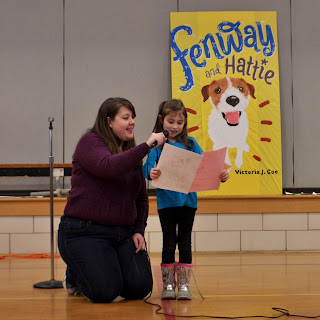I had a similar feeling recently when the ADK chapter I belong to was looking for program ideas. I knew of this new "recipe" for promoting engagement with books that I really wanted to try out. Only, I wasn't sure how it would go over with the crowd. Will they eat it? my worry began. Will they like it?
They put me on the calendar though, and this week, I tried out that new recipe with my colleagues. I hosted my first-ever Book Tasting. My colleagues ate it all up, and I brought home a very full heart (and a cupcake topped with Brown Bear, Brown Bear, too).
Book Tasting is not an original idea. I have heard others' accounts and seen pictures of Book Tasting events done with students and adults in many other settings. The short what of a Book Tasting is that participants have the opportunity to sample several books in the course of the event, giving them just enough to taste to decide if they want more. Beyond that, there seem to be a great variety of ways a Book Tasting could be tailored to the audience and their needs or your purpose.
I also thought about having several small tables of four and seating my guests according to who they worked with (primary students, intermediate students, teachers). I considered serving each table their own platter. I ruled this out for this particular tasting because I wanted the coaches and administrators to see a range of books rather than be limited to one group. This lead me to seat everyone at one big table. I created a spreadsheet with each guest and seat number and laid out the rotation of books so I could "see" which five books each guest would taste. Ultimately, this set up and book passing showed the potential of the same book across different audiences.
The placemat at each place setting was my own creation. I peeked at several other educators' ideas on the internet before making my own. There are lots of resources to be found, many that prompt students to record information about the title/author/genre of the books they taste. Because my audience were colleagues in assorted roles, I wanted the 11x17 placemat to serve as a sheet for note-taking about what books they saw, their ideas and impressions of the book, and who they might tell about the books they tasted. I also knew that my guests would only taste five of the fifteen circulating titles, and that others would talk about titles they did not see, so I included a sixth box for recording other titles mentioned that piqued curiosity. When I created my placemat, I made my prompts specific to my guests and my purpose for hosting the event. I am happy to share a version of my placemat, but this is a really simple way to tailor your Book Tasting to your needs or purpose. Consider rewriting the prompts so that guests are thinking about your teaching point, using language that you use with your readers or learners.
Aside from the books, the most talked about element of the Book Tasting was the environment. I knew I would be hosting the event at school, but I also know it would be evening time and everyone would have already worked a full day and likely been to a staff meeting, too. My classroom library was the perfect place to host, but I wanted it to feel different: warm, homey, special. So, in addition to rearranging the physical space, I brought in lamps to change the lighting and purchased inexpensive red and white checked tablecloths. My colleagues helped with refreshments, including a to-die-for coffee punch and sweet cupcakes adorned with even-sweeter fondant classic book covers.
- Who is your audience?
- What books do you want to introduce them to?
- What do you want to help them learn or notice about books?
- How will you structure the time spent with each book? Note-taking? Reflection/sharing?
- How will you design the space for your Book Tasting? How will your guests be seated?
- How will you reflect on the success of your event?
My first Book Tasting was a big hit, and it was eaten right up. I'd encourage you to try it. As with any recipe, you can borrow mine, but you'll want to season yours to taste. I'd love to hear how it goes.


































